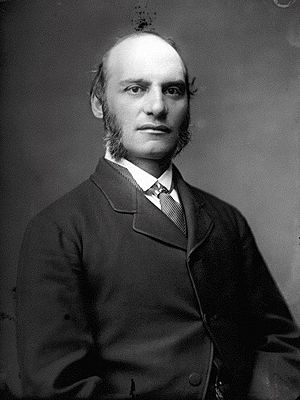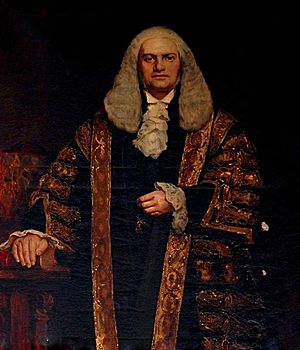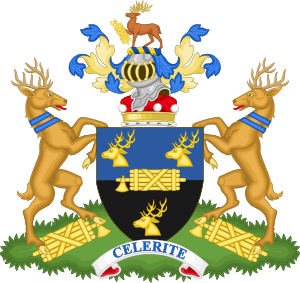Farrer Herschell, 1st Baron Herschell facts for kids
Quick facts for kids
The Lord Herschell
|
|
|---|---|
 |
|
| Lord High Chancellor of Great Britain | |
| In office 6 February 1886 – 20 July 1886 |
|
| Prime Minister | William Ewart Gladstone |
| Preceded by | The Lord Halsbury |
| Succeeded by | The Lord Halsbury |
| In office 18 August 1892 – 21 June 1895 |
|
| Prime Minister | |
| Preceded by | The Lord Halsbury |
| Succeeded by | The Lord Halsbury |
| Personal details | |
| Born | 2 November 1837 Brampton, Hampshire, England |
| Died | 1 March 1899 (aged 61) Washington D.C., United States |
| Political party | Liberal |
| Spouse | Agnes Adela Herschell |
| Alma mater | University College London |
Farrer Herschell, 1st Baron Herschell (born November 2, 1837 – died March 1, 1899) was an important British lawyer and politician. He held the very high position of Lord High Chancellor of Great Britain twice. He served in this role in 1886, and then again from 1892 to 1895.
Contents
Life of Farrer Herschell
Early Life and Education
Farrer Herschell was born on November 2, 1837, in Brampton, Hampshire, England. His father, Ridley Haim Herschell, was from Poland. Ridley had converted from Judaism to Christianity. He became a minister at a Nonconformist church in London.
Farrer went to a grammar school in South London. As a teenager, he also attended classes at the University of Bonn in Germany. In 1857, he earned his degree from University College London. He studied Greek and mathematics and won awards for his work. He was known as a great speaker in the university's debating society.
Starting His Law Career
After university, Herschell decided to become a lawyer. In 1858, he began training at Lincoln's Inn, a famous place for lawyers. He learned from well-known legal experts. His fellow students even nicknamed him "Chief Baron" because he seemed so confident.
In 1860, he officially became a barrister. This meant he could argue cases in court. For a few years, he didn't have much work. He even thought about leaving England to work in China. But soon, he started helping important lawyers. By 1872, he became a Queen's Counsel, which is a senior lawyer. The next year, he became a Recorder for the city of Carlisle, acting as a judge.
Becoming a Member of Parliament
By 1874, Herschell was doing very well as a lawyer. He decided to enter politics and run for Parliament. He was elected as a Member of Parliament (MP) for the City of Durham.
As an MP, he regularly attended the House of Commons. He didn't speak often, but when he did, he was known as a good debater. He helped pass a rule to change laws about broken promises to marry. He also spoke out against a rule that allowed runaway slaves to be returned to their owners. In 1880, Prime Minister William Ewart Gladstone noticed him. Gladstone then made Herschell the Solicitor General.
Serving as Solicitor General
Farrer Herschell was made a knight in 1880, shortly after becoming Solicitor General. He held this job until 1885. As Solicitor General, he helped write many important laws. These included the Irish Land Act 1881 and the Corrupt and Illegal Practices Prevention Act 1883. He also worked on laws about bankruptcy and voting rights.
He also helped create a law that changed how many MPs represented Durham City. This meant he had to leave his seat in Parliament. Even though he lost his next election, Gladstone's party still won the overall election. Unexpectedly, Herschell was then offered the top legal job: Lord Chancellor.
Becoming Lord Chancellor
On February 8, 1886, Farrer Herschell became Baron Herschell of Durham. This made him a Lord. His first time as Lord Chancellor lasted only about six months. This was because a bill about Home Rule for Ireland was rejected, and the government fell.
In August 1892, Gladstone's party returned to power. Herschell once again became Lord Chancellor. He was also made a member of the Privy Council, a group of important advisors to the Queen. In 1893, he received a special honor, the Knight Grand Cross of the Order of the Bath. His second time as Lord Chancellor ended in 1895 when the government changed again.
Other Important Public Work
Besides his political and legal work, Herschell did many other things for the public. He became a Deputy Lieutenant for the counties of Durham and Kent. In 1888, he led an investigation for the House of Commons. He also chaired two royal commissions, which are official investigations. One was about money in India, and the other was about vaccination.
In 1890, he became the Captain of Deal Castle and Lord Warden of the Cinque Ports. He cared deeply about the National Society for the Prevention of Cruelty to Children. He helped pass laws in 1889 and 1894 to protect children. In 1892, he was elected a Fellow of the Royal Society, a group of top scientists.
In 1893, he became the Chancellor of the University of London. He wanted to make the university more modern. He was also involved with the Imperial Institute, a center for trade and research. He was the first chairman of its council. In 1893, he became president of the Society of Comparative Legislation.
In 1897, he was chosen to represent Great Britain on a special commission. This group met in Paris to decide the border between Venezuela and British Guiana. In 1898, he also joined an Anglo-American commission. This group worked to settle border issues between Great Britain, Canada, and the United States, including the Alaska boundary dispute. He traveled to the US for this work and was chosen as the president of the commission.
His Death
In February 1899, while working on the commission in Washington D.C., Herschell slipped and broke his hip. He had worked very hard for many years, and his health was not as strong as it used to be. He died on March 1, 1899, just two weeks after his accident. Doctors found he had heart disease.
Many important people expressed their sadness at his death. The US Secretary of State, John Hay, sent a message to the British Ambassador. The Prime Minister of Canada, Sir Wilfrid Laurier, said Herschell's death was a great loss for Canada and the British Empire.
A funeral service was held in Washington D.C. The US President, Vice-President, and many other officials attended. His body was then brought back to London on a British warship, HMS Talbot. A second funeral service was held at Westminster Abbey. He was buried on March 22, 1899, in Tincleton, Dorset, where he had been married.
Personal Life
Farrer Herschell married Agnes Adela Kindersley in 1876. She passed away in 1902. They had one son, Richard, who became the second Baron Herschell. They also had three daughters: Helen, Muriel, and Agnes.
He was a member of several social clubs, including the Brooks's and the Athenaeum Club. He also received special honorary degrees from the University of Oxford and the University of Cambridge.
Arms



